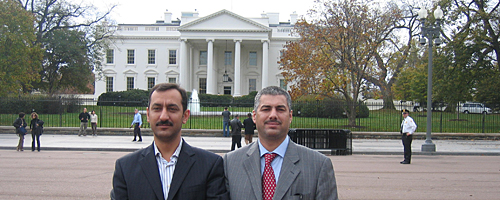Afghan and Iraqi Victims of Torture by U.S. Military Seek Justice From International Human Rights Tribunal


After being shut out of U.S. courts, yesterday we filed a case with the Inter-American Commission on Human Rights (IACHR) on behalf of three Afghans and three Iraqis who were tortured while held by the American military at detention centers in Iraq and Afghanistan. (Pictured above are Sherzad Kamal Khalid, left, and Thahe Mohammed Sabbar, in front of the White House during a visit to the U.S. in November 2005.)
The men are part of a group that in 2005 sued then-Defense Secretary Donald Rumsfeld and three senior military officials in federal court for their torture and abusive treatment. Because that case was dismissed on immunity grounds before reaching the merits, we are taking their case to the IAHCR, an independent human rights body of the Organization of American States. Our petition, the equivalent of a federal legal complaint, asks the commission to conduct a full investigation into the human rights violations and seeks an apology on behalf of the six men from the U.S. government.
Between 2003 and 2004, the men were imprisoned in U.S.-run detention facilities in Afghanistan and Iraq, where, the petition charges, they were subjected to torture and other cruel, inhuman and degrading treatment including severe and repeated beatings, cutting with knives, sexual humiliation and assault, mock executions and prolonged restraint in excruciating positions. None of the men were ever charged with a crime.
Because a remedy for these men has been denied in American courts, these courageous men are seeking to hold the U.S. government accountable on the world stage.
One of the victims, Ali Hussein, was only 17 years old when he was detained by the U.S. military in August 2003. He was held for four weeks at Abu Ghraib prison and other locations throughout Iraq. Hussein, who is now a law student, was shot in the neck and back before being arrested. He was denied food, water and pain medication for almost two days after he was shot.. He said that military personnel refused to provide him medical care for several hours, and when the bullets were eventually removed, the procedure was done without anesthetic. You can read more about the abuse that Hussein and the other plaintiffs suffered here.
In a statement yesterday, Hussein said, “I think that I and the many others who suffered unfairly at the hands of the American government deserve justice. We want America to admit that what happened to us was wrong and should never be allowed to happen again to anyone anywhere.”
As our petition highlights, “[t]he U.S. government’s own reports document that the torture and inhumane treatment that the petitioners were subjected to was not an aberration; on the contrary, it was widespread and systemic throughout the U.S.-run detention facilities in the two countries. These same reports also document that the torture and inhumane treatment of detainees were the direct result of policies and practices promulgated and implemented at the highest levels of the U.S. government.
Despite these reports and petitioners’ and other detainees’ credible allegations of torture and inhumane treatment, the U.S. government has failed to conduct any comprehensive criminal investigation, has not held accountable those responsible, and has not provided any form of redress to the petitioners and the many other victims and survivors of U.S. torture and abuse.”
A district court dismissed the federal case, Ali v. Rumsfeld, on the grounds that constitutional protections do not apply to foreigners in U.S. custody in Afghanistan and Iraq and that the American officials were immune from lawsuits stemming from actions taken “within the scope of their official duties.” In his March 2007 ruling, Judge Thomas A. Hogan of the U.S. District Court for the District of Columbia called the case “appalling,” and noted that “the facts alleged in the complaint stand as an indictment of the humanity with which the United States treats its detainees.” The D.C. appeals court upheld the dismissal last June.
The Ali v. Rumsfeld decision is not unique. It is one of several lawsuits in which victims and survivors of torture have been denied their day in American courts. These cases include Mohamed v. Jeppesen Dataplan, a lawsuit against a flight logistics company that facilitated CIA “torture flights” across the globe; El-Masri v. Tenet, a lawsuit brought by a man abducted and sent to a secret CIA prison in Afghanistan; and Padilla v. Rumsfeld, a lawsuit brought by a U.S. citizen who was unlawfully detained and abused on U.S. soil (this case is currently pending appeal).
Despite U.S. court’s dismissal of these cases, that the United States tortured and abused many men in pursuit of its so-called “war on terror” is not in dispute. As Maj. Gen. Antonio Taguba, who led the U.S. Army’s into the Abu Ghraib prisoner abuse scandal and testified before Congress on his findings in May 2004, has stated publicly: “[t]here is no longer any doubt as to whether the [Bush] Administration committed war crimes. The only question that remains to be answered is whether those who ordered the use of torture will be held to account.”
Although, to date, no high-ranking government officials have yet been held to account for their actions, yesterday’s filing with the IACHR seeks to do just that and to ensure that the government respects basic human rights, including the right of everyone to be free from torture and inhumane treatment.
Learn more about accountability for torture: Sign up for breaking news alerts, , and .

